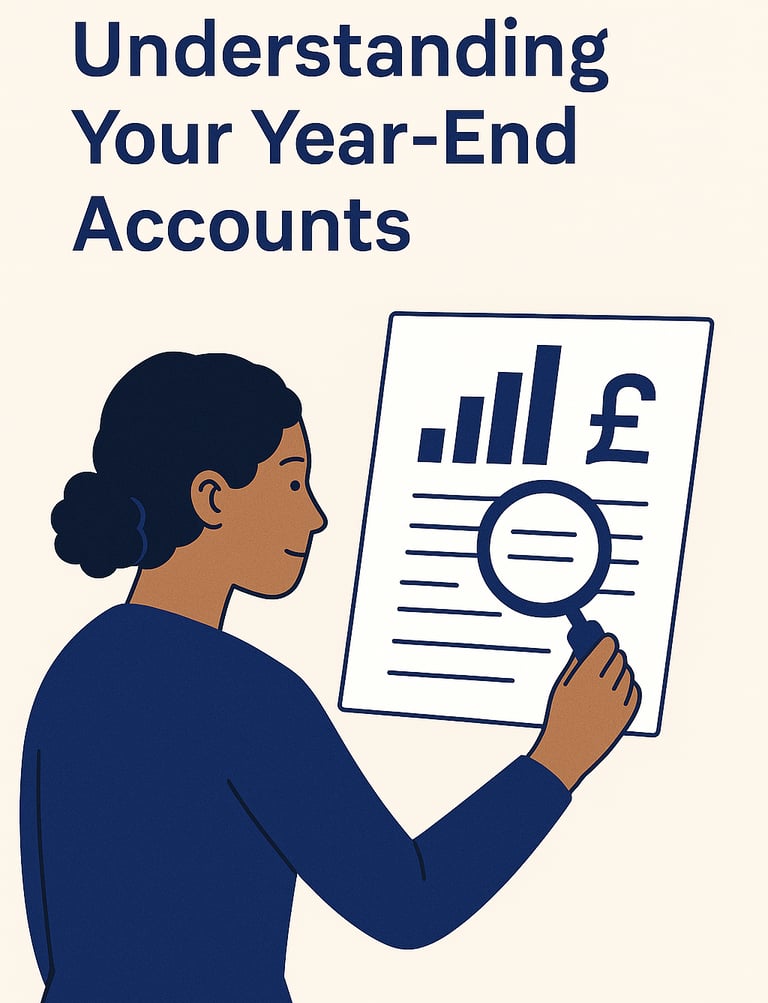Understanding Your Year-End Accounts
A beginner-friendly guide to understanding year-end accounts for UK limited companies. Learn what they include, why they matter, and how Smart AI makes the process simple, stress-free, and fully compliant with HMRC and Companies House.
6/22/20253 min read


Let’s be honest — the term year-end accounts doesn’t exactly inspire excitement. But if you run a limited company in the UK, they’re not just a formality. They’re a legal requirement — and more importantly, they give you a clear picture of how your business is really doing.
If you’ve never filed them before, or just want to understand what’s involved, this guide is for you.
No jargon. No fluff. Just clarity.
What Are Year-End Accounts?
Year-end accounts (also called statutory accounts) are a summary of your business’s financial activity over your company’s financial year. They show HMRC and Companies House how much you made, spent, and owe.
They include:
Profit and loss statement – What you earned vs. what you spent
Balance sheet – What your business owns vs. what it owes
Company details – Registered name, number, director info
Notes – Explanations behind the numbers.
If you're a micro-entity (which many small businesses are), you can submit a simplified version. That’s one of the things we help with at Smart AI.
Why Do They Matter?
Here’s what year-end accounts are really about:
Legal compliance – You must file accounts with Companies House and a tax return with HMRC
Tax calculation – They’re used to work out your Corporation Tax bill
Transparency – Your accounts are made public via Companies House
Business insights – They show whether your business is profitable, growing, or losing money.
Even if you’re the only director, you’re still responsible for filing on time. And yes, penalties apply if you miss the deadline.
When Are They Due?
Your deadlines depend on when your company was incorporated.
For most limited companies, your accounts are due:
9 months after your company year-end (your “accounting reference date”)
12 months after your year-end for the Corporation Tax return
Example:
If your year-end is 31 March 2025:
→ Accounts due to Companies House by 31 December 2025
→ Corporation Tax return due to HMRC by 31 March 2026
We track all these deadlines for our clients — no calendar chaos required.
How Smart AI Makes It Easier
Here’s how we support you:
Xero-powered bookkeeping: All transactions are logged and reconciled throughout the year
Automated alerts: We track your key dates and send reminders in advance
Simplified review process: You get a draft of your accounts to check, with plain-English explanations
Submission support: We file your accounts to Companies House and your CT600 to HMRC — accurately and on time
It’s all done remotely, with secure digital forms, a Google Drive folder, and your own Notion portal.
Real Example: From Scramble to Simple
One of our clients — a solo web developer — used to scramble at year-end. Receipts in drawers, missed invoices, panic every March.
After switching to Smart AI, here’s what changed:
Xero bank feeds matched transactions weekly
Receipts uploaded by email or phone snap
Year-end accounts prepared in January (way before deadline)
No stress, no last-minute surprises
She told us: “It’s the first time I actually understood what my accounts were saying.”
That’s our goal for every client.
Common Questions
Q: Do I need to include personal income in my company accounts?
No. Your company is a separate legal entity. You only report its income and expenses. Your personal tax (e.g. self-assessment) is handled separately.
Q: I didn’t trade this year. Do I still need to file?
Yes. Even if your company was dormant, you still need to file dormant accounts. It’s simpler, but still a legal requirement.
Q: Can I do it myself?
Technically, yes. But for most business owners, it’s more efficient (and less risky) to use an accountant. We make sure your accounts are accurate, compliant, and optimised.
What If I’m Behind?
Don’t panic. We offer catch-up bookkeeping and fast-track year-end filing. Whether you’re a few weeks or a few years behind, we can help you get back on track — and avoid future stress.
TL;DR – Year-End Accounts in summary
They're a legal summary of your business finances for the year
Required for all UK limited companies — even one-person ones
You need to file with both Companies House and HMRC
Smart AI handles it all — from bookkeeping to submission
Our goal is to keep things clear, calm, and stress-free
Ready to Understand Your Numbers?
If you’ve been dreading year-end, we can help turn it into something simple (and even empowering). With the right tools and support, you’ll feel confident knowing your business is on solid ground.
Book a discovery call today — and let’s get your accounts working for you, not against you.
Branding & Message
Social Media
Smart AI Accounting Ltd.
Helping UK small businesses simplify their finances.
© 2025 Smart AI Accounting Ltd. All rights reserved.


Contact Info
📧 info@smartaiaccounting.com
📱 01980 771861, 01980 771868
📍 Amesbury, Salisbury, United Kingdom
🔗 LinkedIn | Facebook
Smart AI Accounting Ltd
Based in Salisbury | Supporting businesses across Amesbury, Wiltshire & the UK
